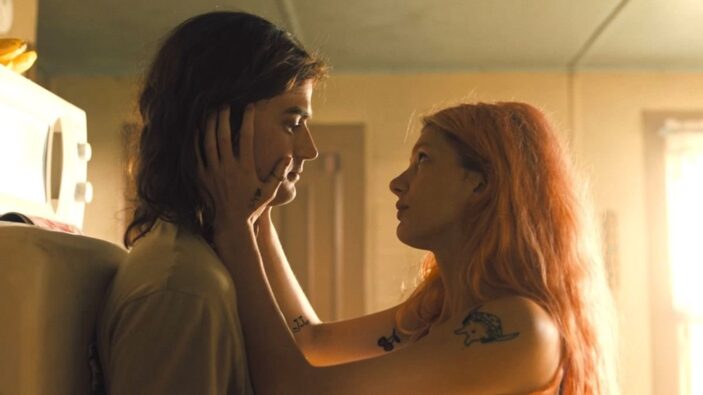
There’s a lot of blunt symbolism and are-they-too-clever-for-their-own-good?-plot twists abound in Marmalade, the feature debut from actor-turned-writer/director Keir O’Donnell (the Australian-American talent known for his roles in Wedding Crashers, American Sniper, and The Dry). It’s an ultimately zippy, enthusiastic caper that probably puts a few too many of its eggs in its culminating basket, but the payoff proves mostly worth the generic trek to get there.
Thankfully, at only 100 minutes O’Donnell isn’t wasting too much of his viewer’s time as we follow Baron (Joe Keery) and the colourful tale he narrates from inside prison, where his intrigued cellmate, Otis (Aldis Hodge, effortlessly stealing any scene he’s in), starts to put a plan in motion that involves the duo breaking out. There’s a large sum of money involved and, as always, a girl – here being the titular Marmalade (Camila Morrone). Before we get to the seductive firecracker that she is though, the film allows enough of a backstory on Baron so that we actually care about him escaping his prison predicament.
Unable to hold down a job in his rural town means the supplies he needs to care for his ailing mother don’t come easily, and though it makes sense for his situation to spur on the idea of robbing a bank, it’s Marmalade’s influence that brings it to fruition. Under normal circumstances these two would never meet, and, indeed, when she enters the film a certain narrative reliability is brought into question, something that proves intentional as the story continues.
With all that takes place between Baron and Marmalade having an air of too-good-to-be-true-ness about it, it seems intentional on O’Donnell’s end that we expect Marmalade as a film to alter the motivations of each character by its end. And when it starts to drop nuggets as to who (and what) can be believed, it exponentially ramps up the film’s personality, which, for a while here, starts to pedal a standard Bonnie & Clyde-like temperament that threatens a certain viewing mediocrity.
The underestimation of characters is what Marmalade banks on, and the various twist-upon-twists manage to reveal themselves in a manner that feel more organic than theatrical. Sure, it can be construed as being all a little too convenient, but the present energy is strong enough for us to forgive a plot device that many other genre features have adhered to. It’s also to the film’s benefit that the lead trio of Keery, Morrone and Hodge are all wholly committed to their characters, and though Morrone may test some viewers patience with her inconsistent nature, she’s perfectly encapsulating Baron’s relaying of her personality. Ironically though, for a film named Marmalade, it’s Baron and Otis that garner the most investing chemistry, with more of their back-and-forth appreciated to offset the many flashbacks the film enlists to further Marmalade’s part in corrupting Baron.
With a tighter edit and an increased focus on Keery and Hodge’s playful chemistry, Marmalade could’ve truly utilised its obvious potential. As it stands it’s a serviceable crime caper, one that pulls off an admittedly exciting heist – it just has a few too many steps to get there in the process.
![]()
![]()
![]()
![]()
![]()
THREE STARS (OUT OF FIVE)
Marmalade is screening in limited release and is available On Demand now in the United States. It’s currently available to rent and/or buy on Digital in Australia.
